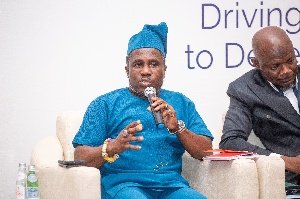Business News of Wednesday, 16 April 2025
Source: www.ghanawebbers.com
BOST to prioritise local participation in downstream petroleum expansion drive
Nana Amoasi VII highlighted a lack of significant investments in BOST. Over the past decade, there have been no improvements to transportation and storage facilities. This stagnation is problematic due to rising fuel demand. Neighbouring countries are interested in using Ghana’s infrastructure. Countries like Mali and Burkina Faso want to move products through BOST.
To address this demand, BOST plans several projects in the coming years. These include doubling its barge fleet on Volta Lake. They will also expand the aging pipeline network. A new storage terminal will be built in Takoradi for the western corridor.
One key project is the Buipe to Bolgatanga Petroleum Products Pipeline (B2P3). Nana Amoasi VII called it essential for regional logistics. The 261-kilometre pipeline has an 8-inch diameter and can hold 8,800 cubic meters. It will help deliver products to Upper East and Sahelian regions.
Currently, Ghana has one six-inch pipeline from Tema to Akosombo, built in 1995. This pipeline's lifespan is between 25 and 40 years. BOST aims to upgrade and expand this capacity soon. The Tema-Akosombo Petroleum Pipeline (TAPP) carries multiple products but needs expansion.
BOST's strategy emphasizes local participation in these projects. Ghanaian firms will receive exclusive contracts for major tasks like pipeline construction. Nana Amoasi VII stated that a Ghanaian company would lay a new pipeline from Tema to Akosombo.
This initiative supports national efforts for indigenous businesses' involvement in public infrastructure investments. BOST invites local private sector actors to invest in logistics as well.
Another plan includes creating a strategic fuel stock facility for six weeks of supply. This facility aims to protect against import disruptions during crises.
“To maintain this stock, we need dedicated tanks,” Nana Amoasi VII explained. He mentioned either upgrading existing depots or building new ones for this purpose.
The proposed Takoradi terminal will utilize the port’s deep-water jetty efficiently for fuel imports. It positions Ghana as a supplier for Ivory Coast and Liberia as well.
While these initiatives require investment, there are opportunities for Ghanaian firms in energy logistics. “Ghanaian companies should benefit from every investment in petroleum,” he concluded.











